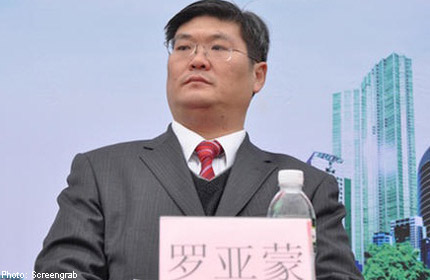
CHINA - Those who have met Li Guangnian said he dressed, spoke and behaved like a typical Chinese official - a high-ranking one, no less.
His name cards gave his title as party boss of a "China Dynamic Investigation Committee" attached to a research centre under the Central Party School, the Communist Party's top training institution.
His office, located in the same district as Beijing's public security bureau and prosecutor's agency, also lent him an air of authority.
But everything about Li was bogus, right down to the agency he supposedly worked for.
His cover was blown last month when an anonymous netizen, hoping to expose yet another wayward official, posted online a photo of him with an 18-year-old woman in bed.
"This is Li Guangnian, the party secretary and a director of the Central Party School... He is a corrupt official and has many other mistresses," the post read.
The buzz the expose created online died down when the party school issued a statement declaring that it did not have any official by the name of Li Guangnian and that the committee he claimed to head does not exist.
The latest saga blows the lid off China's long-running problem with bogus officials - and highlights the difficulties the authorities have faced in weeding them out.

In a country where government approvals and connections are essential to getting things done, con men like Li have found that there is money to be gained by masquerading as government officials.
Some con men have gone to great lengths in devising their schemes - hiring staff, leasing premises and conjuring up make-believe names for their phoney agencies.
A classic case has to be the "China Chengguan Leaders' Forum" set up in 2007 by a con man named Luo Yameng. Chengguan refers to "urban administration" bureaus responsible for low-level policing on China's streets. Luo, claiming to be the forum's secretary-general, managed to collect admission fees from more than 100 local chengguan officials.
In 2008, another fake organisation exposed was the China Scales Study Administration set up by a man named Zhang Ningquan, who leased offices in the former justice ministry's premises in Beijing and claimed that his organisation was part of the ministry.
From 2004 to 2008, he reportedly reaped some 160 million yuan by getting businessmen to invest in local training institutions he claimed to be setting up.
While most are motivated by money, some con men are attracted by the attention and lavish treatment they receive from eager- to-please local officials.
Observers say bogus officials are hard to eradicate due in large part to China's political system. First, the political system hinges on connections and there is a culture of paying people to get things done, like securing better jobs or central government funding for projects, according to public administration expert Liu Junsheng.
"It is a problem of demand and supply," the scholar at China University of Political Science and Law told The Sunday Times.
He added that China's opaque political system also makes it hard to verify the claims of visiting officials, especially those who say they are the offspring of senior leaders and officials.
It doesn't help that the con men have acquired sophisticated "skills", Professor Wang Yukai of the Chinese Academy of Governance told the Beijing News daily.
In the case of Li, who remains at large and is alleged to have swindled people of at least 300 million yuan (S$62 million), he registered his committee in Hong Kong as it is tough to register an organisation whose name contains "China" or "National" in mainland China.
Said Prof Liu, who believes the problem of bogus officials will persist: "There is no easy solution. The government can only educate people to be more alert and do the necessary checks."

